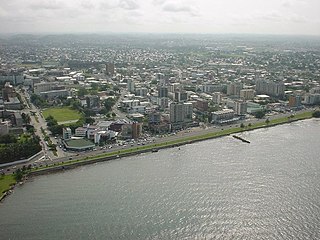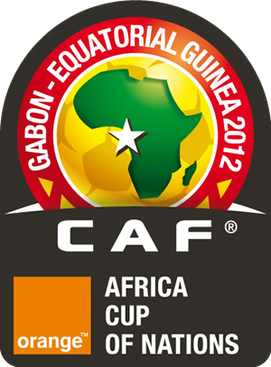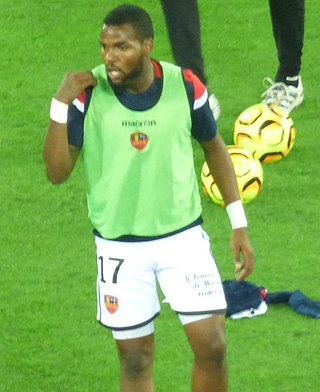| |||||
| Decades: | |||||
|---|---|---|---|---|---|
| See also: | |||||
Events in the year 1990 in Gabon .
| |||||
| Decades: | |||||
|---|---|---|---|---|---|
| See also: | |||||
Events in the year 1990 in Gabon .

Gabon, officially the Gabonese Republic, is a country on the Atlantic coast of Central Africa, on the equator, bordered by Equatorial Guinea to the northwest, Cameroon to the north, the Republic of the Congo on the east and south, and the Gulf of Guinea to the west. It has an area of 270,000 square kilometres (100,000 sq mi) and a population of 2.3 million people. There are coastal plains, mountains, and a savanna in the east. Libreville is the country's capital and largest city.
Little is known of the history of Gabon before European contact. Bantu migrants settled the area beginning in the 14th century. Portuguese explorers and traders arrived in the area in the late 15th century. The coast subsequently became a centre of the transatlantic slave trade with European slave traders arriving to the region in the 16th century. In 1839 and 1841, France established a protectorate over the coast. In 1849, captives released from a captured slave ship founded Libreville. In 1862–1887, France expanded its control including the interior of the state, and took full sovereignty. In 1910 Gabon became part of French Equatorial Africa and in 1960, Gabon became independent.

Gabon has followed a non-aligned policy, advocating dialogue in international affairs and recognizing both parts of divided countries. Since 1973, the number of countries establishing diplomatic relations with Gabon has doubled. In inter-African affairs, Gabon espouses development by evolution rather than revolution and favors regulated free enterprise as the system most likely to promote rapid economic growth. Concerned about stability in Central Africa and the potential for intervention, Gabon has been directly involved with mediation efforts in Chad, Central African Republic, Republic of Congo, Angola, and former Zaire. In December 1999, through the mediation efforts of President Bongo, a peace accord was signed in the Republic of Congo between the government and most leaders of an armed rebellion. President Bongo has remained involved in the continuing Congolese peace process. Gabon has been a strong proponent of regional stability, and Gabonese armed forces played an important role in the UN Peacekeeping Mission to the Central African Republic (MINURCA).

Libreville is the capital and largest city of Gabon, located on the Gabon Estuary. Libreville occupies 65 square kilometres (25 sq mi) of the northwestern province of Estuaire. Libreville is also a port on the Gabon Estuary, near the Gulf of Guinea. As of the 2013 census, its population was 703,904.

The president of Gabon is the head of state of Gabon. A total of three people have served as president since the post was formed in 1960.

The flag of Gabon is a tricolour consisting of three horizontal green, yellow and blue bands. Adopted in 1960 to replace the previous colonial flag containing the French Tricolour at the canton, it has been the flag of the Gabonese Republic since the country gained independence that year. The design of the present flag entailed the removal the Tricolour and the widening of the yellow stripe at the centre.

Gabon's music includes several folk styles and pop. Gabonese pop artist Patience Dabany, who now lives in the US, produces albums recorded in Los Angeles with a distinctively Gabonese element; they are popular throughout Francophone Africa. Other musicians include guitarists Georges Oyendze, La Rose Mbadou and Sylvain Avara, and the singer Oliver N'Goma. Imported rock and hip hop from the US and UK are popular in Gabon, as are rumba, makossa and soukous.
The Gabon national football team represents Gabon in men's international football. The team's nickname is The Panthers and it is governed by the Gabonese Football Federation. They have never qualified for the FIFA World Cup, but have qualified eight times for the Africa Cup of Nations. Gabon is a member of both FIFA and Confederation of African Football (CAF).

The prime minister of Gabon is the head of government of Gabon.

The Central African Republic national football team, nicknamed Les Fauves, is the national team of the Central African Republic and is controlled by the Central African Football Federation. They are a member of CAF. Despite being traditionally one of the weakest teams in Africa and the world, they recently achieved success. They won the 2009 CEMAC Cup by beating Gabon in the semi-finals and Equatorial Guinea in the final 3–0. Their FIFA ranking rose from 202nd in August 2010 to 89th by July 2011. On 10 October 2010, they earned a shock 2012 Africa Cup of Nations qualifier win at home against Algeria 2–0, which put them top of their qualification group. The team won its first FIFA World Cup qualifier on 2 June 2012 after beating Botswana 2–0 at home.

Ali Bongo Ondimba, also known as Ali Bongo and Ali Ben Bongo, is a Gabonese former politician who was the third president of Gabon from 2009 to 2023. He is a member of the Gabonese Democratic Party. He is the son of Omar Bongo, who was president of Gabon from 1967 until his death in 2009. During his father's presidency, he was Minister of Foreign Affairs from 1989 to 1991, represented Bongoville as a deputy in the National Assembly from 1991 to 1999, and was the Minister of Defense from 1999 to 2009. After his father's death, he won the 2009 Gabonese presidential election. He was reelected in 2016, in elections marred by numerous irregularities, arrests, human rights violations, and post-election protests and violence.

The 2012 Africa Cup of Nations, also known as the Orange Africa Cup of Nations for sponsorship reasons, was the 28th edition of the Africa Cup of Nations, the football championship of Africa organized by the Confederation of African Football (CAF).

Gabon – United States relations are bilateral relations between Gabon and the United States.

Pierre-Emerick Emiliano François Aubameyang is a professional footballer who plays as a striker for Saudi Pro League club Al Qadsiah and captains the Gabon national team.
The mass media in Gabon is primarily monitored by the Gabon government. Although the main newspapers are associated with the government, there are private broadcasters, and private weekly newspapers that are mostly controlled by opposition parties.

Gabon competed at the 2012 Summer Olympics in London, from 27 July to 12 August 2012. This was the nation's ninth appearance at the Olympics; the nation did not participate at the 1976 Summer Olympics in Montreal and 1980 Summer Olympics in Moscow, affected by the African and the American-led boycott, respectively.

Aaron Salem Boupendza Pozzi is a Gabonese professional footballer who most recently played as a forward for Major League Soccer club FC Cincinnati and the Gabon national team.

The 2017 Africa U-17 Cup of Nations, officially known as the Total U-17 Africa Cup Of Nations, Gabon 2017, was the 12th edition of the Africa U-17 Cup of Nations, the biennial international youth football tournament organized by the Confederation of African Football (CAF) for players aged 17 and below.
The COVID-19 pandemic in Gabon was a part of the ongoing worldwide pandemic of coronavirus disease 2019 caused by severe acute respiratory syndrome coronavirus 2. The virus was confirmed to have reached Gabon in March 2020.

Yugoslavia developed relations with Gabon as a part of its prominent and active involvement in the Non-Aligned Movement. Formal diplomatic relations between the two countries were established in 1960.